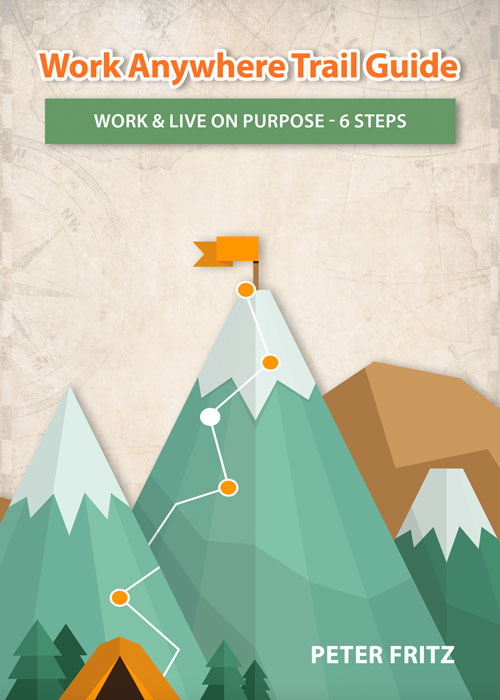[fusebox_track_player url=”https://www.buzzsprout.com/1079927/4906055-how-to-make-extra-money-at-home-as-a-remote-worker-112.mp3?blob_id=19572665&download=true” social_linkedin=”true” social_email=”true” ]
The daily commute is no more. In its place, there’s a delightful vacuum of available hours to indulge long-suppressed curiosities, desires, and human needs. This pandemic that’s torn across our planet has done incalculable damage, but it’s also produced something no one had before – free time.
But with free time comes uncertainty. Most of us aren’t used to having empty blocks in our schedule, and although we lament our busy-busy days, there’s also a measure of comfort in knowing what to do next.
How should you use this time? Can you use it to make some extra money on the side? My answers are ‘boldly’, and ‘hell, yes!’
Like many countries around the world, Australia has been subject to rolling lockdowns, meaning trips to restaurants, weekend escapes and visiting friends are off the agenda. Melbourne is famous for its cafes and restaurants, but right now, the CBD looks like a zombie movie. The streets are dead, save for bits of trash swirling in the wind and a few lost souls with nowhere to bunk down for the night.
Just last week, I drove to the city to get supplies, and the freeway ahead of me and behind me were completely empty. I felt like I was the last survivor in a post-apocalyptic world.
But this new reality, strange and unfamiliar as it is, also presents an incredible opportunity for anyone with a bit of ambition and the willingness to have a crack at creating something.
Since I was a kid, I’ve always had something going on the side – from the handcrafts I sold to neighbours, to freelance writing and web design gigs, right through to app development for multi-billion-dollar companies. Perhaps it in my DNA, but I’ve never been satisfied doing one thing. I think people like me are called multipotentialites. Maybe I’m just easily bored.
Unprecedented Convergence = Opportunity
Recently, though, millions of us have glimpsed a window into a world of fresh possibilities. The massive surge in remote work combined with easy Internet access, cheap software tools and a global audience has made this a new and exciting period to be alive.
For the first time in history, people in developed nations have both the catalyst and the means to create something of their own without betting the farm or giving up what they already have.
Call it a side hustle, solopreneurship or freelancing – regardless of how you define it, it’s here, and it’s available to just about everyone.
So,
- How do you make extra money without a second job?
- What can you offer, and how do you get it out there?
- How do you begin with just a few hours a day?
- How do you build something without risking your job?
How to make extra money (without being sleazy or getting a second job)
A few weeks ago, I read a fabulous book by Matthew Kimberley call Get a F*cking Grip. I was so enthralled, I immediately bought another four – one for my girls, and three to give away on my podcast interview with him (episode 114, August 14th).
In it, Matthew delivers the kick up the arse many of us sorely need, and he does it in a way that’s digestible, actionable and hilarious. Read it and you’ll find yourself nodding throughout, mumbling, “Shit, that’s simple!”
So in the spirit of that very fine tomb, I will tell you that the keys to making money on the side are also very simple. Here they are.
- Offer something people want, then bundle it with what they need
- Over-deliver on your promises (and never promise what you can’t)
- Charge a fair price (it’s often more than you think)
- Ask for referrals (until you don’t need to anymore)
Of all the sales and marketing tactics I’ve tried (and marketing is my specialty), these will always endure.
What to sell and how to sell it
So what can you sell and how can you sell it?
For the second part, I’ll defer to Corbett Barr and the fine folks over at Fizzle.co. In their fabulous roadmap, they teach you about the range of business archetypes available to anyone wanting to start a side hustle. They are:
- Freelancer – writers, photographers, marketers, graphic designers, consultants, etc. – something I’ve done most of my life
- Teacher – structured learning on specific areas of expertise (think Udemy, Teachable, Kajabi and LearnDash)
- Curator – sharing interesting and topical information created by others (blog, podcast, social media, YouTube, etc.)
- Leading Learner – sharing your journey as you learn something yourself
- Maker – a creative or a manufacturer who produces tangible goods of their own design (eBay, Etsy, Shopify, WooCommerce)
- Retailer – selling other people’s goods (eBay, Amazon, Shopify, WooCommerce)
- Mediapreneur – a content creator (blogger, video maker or podcaster)
- Thought Leader – someone who shares ideas and concepts through publishing and speaking (books, webinars, blog, YouTube, online courses)
Figuring out what to sell lies at the intersection between three questions:
1. What are you passionate or excited about?
When I was younger, it was photography and dirt bikes. By the age of 16, my first article (with photos) appeared in my favourite dirt bike magazine. My fourth article caught the eye of an art director, which led to the launch of my career in print media and set off a series of exciting events that money could not buy (think Lambos, private jets, racetracks, presidential suites and hanging out of choppers three feet off the deck in outback Australia).
Later, it was the Internet and web design that enthralled me, leading to the first of many paid gigs in Web design back in 1996.
Today, it’s everything around intentional living, creating projects I care about, making memories with the people I love, and forging my own tiny dent in the universe. Midlife Tribe was the start of all that. Office Anywhere continued the work, and soon, a new project will bring it all into one place.
2. What skills, talents or perspectives do you have?
The first two needn’t be especially unique, as the last one will make them unique enough to stand out, providing you share openly and authentically. I believe that the time for injecting humanness into business has well and truly arrived. Those who imbue their work with their unique own voice and style command a loyal following because it plays to the human propensity to choose those who are like us, while simultaneously deflecting those who aren’t.
Are they around the thing you do for a living now? Do you have experience or training is a certain discipline that’s laid dormant for a while?
My skills include taking complex problems and devising affordable solutions to them; visual design, and the written word (although I still have a long way to go on these). The fact is, though, my skills and talents are sufficient to charge a good price for them. It’ll be the same for you, too.
These days, I’m focussed on improving my skills as an interviewer for my podcast, and as a video-maker to augment my written work.
3. Where do you have a bit of leverage or existing influence and credibility?
Do you have contacts in your industry, some past accomplishments (personal or professional) that you can highlight, or are you neck-deep in tackling something you can share with authority?
Perhaps you’ve been writing a blog for a year. Can you fashion the content you’ve already created into a book, a podcast, or a series of YouTube videos? Could you create a course on past works?
Have you done some work or some favours for a person who can amplify your message through their own contacts or audience? Can you talk about your area of interest or expertise on someone else’s podcast?
If you approach what you’re doing with a deep desire to serve, you’ll find endless channels through which to share your message.
Where is your intersection?
Now for the trick.
Which of your passions, interests, skills, talents, perspectives and points of leverage can you combine into something to talk about, teach or curate content for? What could you design, make, sell, promote or produce content around?
Secondly, is there a demand out there in the world – even a small niche – that would benefit from what you have to share around this topic? Google it and see. If there are other people doing it and succeeding with it, that’s a good sign – it means there’s a demand for products or services around your chosen topic. Fast food restaurants congregate in common areas because it helps each of them.
Do you need a passion?
No, you don’t have to do something you’re passionate about to succeed. But unless it interests you directly (doing the thing) or indirectly (you like the outcomes of doing the thing), it’ll be hard to keep at it long enough to succeed. You needn’t follow your passion, but it makes the journey more enjoyable and easier to sustain when you’re bashing away at it while the family sleeps or your friends are throwing prawns on the barbie. (No, not that Barbie.)
Passion is like inspiration; they’re both highly overrated.
Typically, passion comes from mastering something difficult, while inspiration is the byproduct of toil, not navel-gazing.
If something interests you enough to learn what’s required to convert it into something saleable, then go for it. You can iterate, refine, and even pivot as you go.
You’re far more likely to find your muse in the pursuit than in your daydreams.
What can you sell?
By far the easiest thing to sell is a skill or talent you already possess. I sell my marketing, copywriting and design skills because they’re the things I’m good at. You might be good at teaching, entertaining, making videos or crafting stuff in the back shed. Luckily for us, the world is our audience, and with the right tools, you can sell what you offer to just about any country on this little blue ball of ours.
And don’t worry about being a certified expert unless you’re a proctologist – or anything with ‘ologist’ in its name. Chances are, you’re ‘expert enough’ at something, or more likely, a combination of somethings.
Create as you learn. It’s the only way you’ll really understand what you’re doing and which areas to focus on. And the stuff you suck at can usually be outsourced to others for peanuts (think Fivver, Upwork and Freelancer).
There are tonnes of other resources I could recommend. Chris Guillebeau’s Side Hustle School and Pat Flynn’s Smart Passive Income are fantastic, and I can vouch for their integrity and genuine desire to help you along your journey.
Also, learn ONLY what you need at any given point while you experiment. Become a proponent of just-in-time learning rather than overwhelming yourself with a tonne of just-in-case learning.
The Channels that Pay
So where does the money come from?
- Sell tangible or intangible products – either yours or someone else’s (your own website eBay, Amazon, Facebook, etc.)
- Publishing – produce and sell your own books or guides (usually in PDF or Kindle format)
- Advertising revenue – where you share in the fees paid by advertisers to appear alongside your content (e.g. Google AdSense, Clickbank, etc.) Unless you have lots of web traffic, the income from this is paltry, so you’re usually better off choosing another revenue channel.
- Affiliate revenue – where you recommend (versus direct-sell) other people’s products and earn a small commission if they purchase through your link (e.g. Amazon Affiliates).
- Training – either online (video, email or downloadable content) or offline (not so easy right now)
- Sponsorship – where brands pay you a fee to align with/appear in your content (some of the top podcasts and YouTube channels earn revenue this way)
- Consulting/Freelancing – where you deliver specialised services for a fee (the easiest for most people starting out)
Amongst these options lives an ideal fit for you – perhaps a combination of two or three.
My daughter, Sarah, made a huge name for herself doing make-up videos on YouTube, and when a few of them clocked up millions of views, she earned Gucci levels of revenue from the ads. But it soon faded, and now she makes a very solid income doing make-up for others and teaching her amazing skills through live webinars. She’s a smart cookie, my girl.
She still has her Gucci pumps, too.
Don’t get fired (by your boss or your family)
Like a lot of people, I’m excited by new beginnings, and in my early days of entrepreneurship, I allowed my endeavours to consume huge tracts of time. Every couple of years, I’d have a new project in the works, and it was common to find me basking in the glow of a screen at four in the morning after starting my day 21 hours earlier. I figured sleep was for the lazy, and I was on the superhighway to stupendous wealth, so sleep, health and cognitive function be damned.
Being excited and ambitious is a powerful ally, but it can ruin your life if you’re not careful.
You can find yourself Googling solutions to your burgeoning empire’s insatiable needs when you should be at your regular job. Do this long enough, and not only will your family disown you, but your boss will, too.
The trick is to schedule your activities. You have to compartmentalize your days into the things that matter. At the simplest level, that might include:
- Your job
- Your family
- Exercise & rest
- Your side hustle
Decide how much time each of them gets per day, and bloody stick to it. It’s not about balance – life is rarely an exercise in that – it’s about being 100% present and effective in each area for the time allotted.
For many of you, your most productive and enlightened hours for your creative side projects will be in the early hours of the morning. There’s a reason why most uber-successful people are early risers. The house is quiet, your brain is fresh, and tackling your side hustle when everyone’s asleep makes you feel in control of your life. You’re the early bird who deserves the worm.
Act like the boss is watching.
As I’ve said before, I like to pretend my home office has a secret camera over my shoulder, and my boss is on the other end of the feed, eating vintage cheese and watching my every move. It mightn’t be exactly healthy, but it ensures that when I’m on the clock, I stay on my game. Never bite the hand that feeds you.
Something else you must do is communicate often. Keep your boss and your colleagues up to date with your work, and share your progress often. Recognise that your boss quietly suspects you’re curled up in front of the telly eating Tim Tams, so surprise and delight her by proving otherwise. Keep the Tim Tams on your desk if you must.
Plenty of employers are nervous about staff who work from home, so right now their anxiety is at peak levels. Your goal is to show them you’re not just effective at home, but more effective than you would be if you were cooped up in your cubicle.
And another thing, don’t telegraph your side hustle successes until you’re earning enough to wave your job goodbye. It sends the wrong signal (“I don’t need you”), and it raises unnecessary suspicion. If you’re sticking to your allotted time for your side project and you remain an effective employee, there’s no reason to seek accolades for your entrepreneurial activities. You should get enough pats on the back for the job they’re paying you to do.
A friend of mine built a sizable business on the side, which allowed him to save all the income from his job. When it was time to say “Bye, Felicia!”, he had a big financial buffer in the bank to help him navigate the next chapter without stress.
Bottom line: be an exceptional employee, and bank the earnings for as long as you can. Your boss will thank you, and so will your balance sheet.
And don’t forget your family. It’s better to build something slowly and keep your relationships sound than to make it fast but lose the people who matter most. You can’t fix your relationships later, but you can easily tack another year or two onto your side hustle. Take your time and enjoy the journey.
They say idle hands do the devils work. You’ve been blessed with something more valuable than money, fame or status. You’ve been given time. Don’t lay idle. Treat this once-in-a-generation event as the opportunity it is.
As one of my mentors, Michael Yardney, says, “Spend your time, wisely.”
.
![]()
Recent Posts
The Most Desirable Job Title in 2020
My youngest daughter, Sarah, just had her 17th birthday. In contrast to her 2016 Halloween bash when 100 teenagers descended on our home, this was a small gathering of just seven. As a seasoned entertainer, Sarah organised everything herself - the food (including...
How Working from Home Helped me Connect with my Kids
[smart_track_player url="http://traffic.libsyn.com/midlifetribe/How_working_from_home_helped_me_connect_with_my_kids_097.mp3" background="#f2f2f2" social_gplus="false" social_linkedin="true" social_email="true" ] When I was young, dumb and full of... hormones, I...
Remote worker Jason Lengstorf & The Cult of Work you Never Meant to Join
[smart_track_player url="http://traffic.libsyn.com/midlifetribe/Remote_worker_Jason_Lengstorf_-_The_Cult_of_Work_you_Never_Meant_to_Join_-_095.mp3" background="#f2f2f2" social_gplus="false" social_linkedin="true" social_email="true" ] In early 2018, I enlisted the...
10-year-old you is trying to tell you something.
[smart_track_player url="http://traffic.libsyn.com/midlifetribe/10-year-old_you_is_trying_to_tell_you_something_-_093.mp3" background="#f2f2f2" social_gplus="false" social_linkedin="true" social_email="true" ] Like millions of children living in good middle-class...
Cut the crap from your life and start living.
[smart_track_player url="http://traffic.libsyn.com/midlifetribe/Cut_the_crap_from_your_life_and_start_living_-_091.mp3" background="#f2f2f2" social_gplus="false" social_linkedin="true" social_email="true" ] Here's some delightful news: you’re going to die one day -...
Create a business from what you already know.
[smart_track_player url="http://traffic.libsyn.com/midlifetribe/Create_a_business_from_what_you_already_know_-_089.mp3" background="#f2f2f2" social_gplus="false" social_linkedin="true" social_email="true" ] Tim Ferris - author of The 4-Hour Work Week - has a lot to...
Step 1: Work from home.
Step 2: Create a life.
Download the Guide








